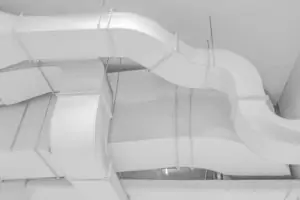18 Jan 9 Reasons Why HVAC Systems Get Dirty
 HVAC systems are integral to any commercial building, providing heating, ventilation, and air conditioning to keep the interior comfortable and safe. However, over time, these systems can become dirty, which can lead to a variety of problems. By understanding the factors that can lead to a build-up of contaminants in your HVAC duct system, you can take steps to prevent it from happening.
HVAC systems are integral to any commercial building, providing heating, ventilation, and air conditioning to keep the interior comfortable and safe. However, over time, these systems can become dirty, which can lead to a variety of problems. By understanding the factors that can lead to a build-up of contaminants in your HVAC duct system, you can take steps to prevent it from happening.
Here are the top nine reasons why HVAC systems get dirty:
Poor maintenance
Waste products can build up in the system without proper maintenance, leading to reduced efficiency and potential malfunctions.
There are a few different ways that poor maintenance can lead to a dirty HVAC system, including:
- Skipping regular cleanings
- Neglecting to change filters or opting for substandard replacements
- Running the system without proper servicing
- Failing to address minor issues before they become more significant (and costly) problems
Outdoor pollution
The air outside of a building can be full of pollutants such as dust, pollen, and other particulate matter, which can make their way into the HVAC system through the air intake vents.
These vents are designed to bring fresh air into the building, but if they aren’t properly sealed or maintained, they can allow contaminants to enter the system too.
Indoor pollution
Several factors, including employee activities, cooking, cleaning chemicals, and more, can cause indoor air pollution. These impurities then accumulate in the HVAC duct system, reducing its effectiveness and potentially causing health issues for those breathing the air.
Humidity
High humidity levels in the surroundings can lead to the growth of mould, mildew and bacteria, which can build up in the system and circulate throughout the building. If not addressed, this growth can lead to a number of issues, including health risks, poor air quality and reduced system efficiency.
Leaky ducts
Gaps, tears, disconnected ducts and poorly sealed joints act as byways for contaminants to enter the ducts, and over time, this can lead to a significant accumulation of dirt and debris.
Pests
Pests such as rodents and insects can enter the HVAC system through gaps in the ducts and leave behind nesting materials and droppings that can accumulate and create obstructions.
Inadequate filters
To ensure the longevity of your HVAC system, it’s crucial to select the right filter. Not only will this help prevent impurities from entering your ducts, but it also guarantees that your system is operating at its best capacity. The filter should be suitable for the size and type of your HVAC system to provide optimal protection and functionality. Neglecting to choose a filter appropriate for the job could lead to more pollutants infiltrating your air quality. Filters need regularly replacing, as they can become clogged over time.
Age of the unit
A HVAC duct system that is older than ten years and has not been adequately maintained can be more prone to dirt and debris build-ups. In addition, the older a system is, the more likely it is to have worn parts and gaps that allow in dust and grime.
Improper Installation
An incorrectly installed system can quickly become contaminated with excess dust and dirt. Therefore, it’s important to have your HVAC system installed and maintained by a qualified professional, to ensure that the system is correctly sized, fitted and sealed to reduce the chances of contaminants infiltrating the system.
Professionally cleaning and inspecting your system regularly will help to prevent unwanted build-ups that can result in poor air quality, reduced system capability and health issues.
It’s vital to work with a qualified professional to ensure the system is installed and maintained correctly so that your HVAC system can provide you with optimal performance for years to come.
To learn more about the duct cleaning and maintenance services we provide here at Deduct Ltd, please get in touch. Our friendly, knowledgeable staff will be more than happy to answer any questions and advise you on the best course of action for your system.
